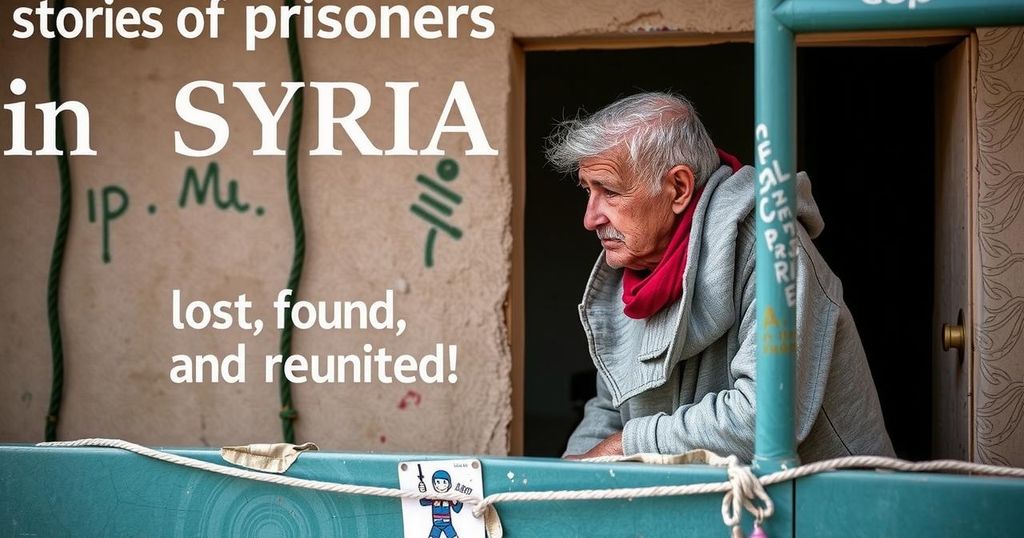The Dead, the Missing, and the Reunited: Tales of Syria’s Prisoners
The article discusses the tragic experiences of familial loss and resilience in the aftermath of Syria’s civil war, focusing on three individuals—Mazen al-Hamada, Rania al-Abbasi, and Tal al-Mallouhi—whose stories reflect the suffering endured by many prisoners and the urgent quest for justice amid enduring oppression.
In the aftermath of President Bashar al-Assad’s regime, Syrians have begun searching for loved ones believed to be imprisoned or missing. Thousands have been freed from oppressive detainment, yet many remain unaccounted for. The Syrian war, spanning 13 years, has resulted in nearly half a million fatalities, with an estimated 100,000 deaths occurring in government-run prisons. Amid these heartbreaking tales, three stories resonate profoundly: Mazen al-Hamada, Rania al-Abbasi, and Tal al-Mallouhi, whose experiences embody the suffering and resilience in Syria.
Mazen al-Hamada became pivotal to the uprising against Assad, facing arrest and horrifying torture in prison. After years of struggle and surviving heinous abuse, Mazen sought to raise awareness of his plight. Despite his efforts, including speaking engagements in the US and Europe, he eventually succumbed to despair, returning to Syria, where he disappeared again. Tragically, his remains later surfaced, serving as a grim reminder of the regime’s brutality and the ongoing suffering of countless Syrians.
Rania al-Abbasi’s story exemplifies familial anguish amidst political repression. She and her husband, alongside their six children, were arrested during a humanitarian act and disappeared without a trace. Her sister Naila has campaigned tirelessly for their whereabouts, compelled to search for any news about her loved ones while grappling with the uncertainty that engulfs families of the missing. Sadly, she remains without answers, representing the anguish of approximately 100,000 Syrians whose fates remain unknown.
Lastly, Tal al-Mallouhi, a young poet arrested for expressing her views, remained behind bars longer than initially sentenced. Her mother, Ahd, expressed overwhelming joy upon Tal’s eventual release after years apart. Nevertheless, her freedom is tempered by the trauma endured during her unjust imprisonment. Tal’s case and her poignant poetry symbolize the resilience of a generation longing for change in Syria, echoing the experiences of many under the regime’s oppressive rule.
Together, these narratives reveal the profound personal toll of the Syrian conflict, underscoring the urge for accountability and justice. Each story serves as a testament to the lives affected by the regime’s cruelty, emphasizing the need for continued advocacy and remembrance of those who have suffered and those still missing.
The article addresses the profound human impact of the ongoing Syrian civil war, particularly focusing on the personal stories of individuals who have faced the consequences of political repression and brutality. With the regime’s pervasive violence, many families have been torn apart, leading to widespread suffering and an urgent need for justice. The achievements and ongoing struggles of notable figures like Mazen al-Hamada, Rania al-Abbasi, and Tal al-Mallouhi highlight the resilience of the Syrian people amidst adversity, as well as the international community’s responsibility to seek accountability for the horrors endured.
In conclusion, the stories of Mazen al-Hamada, Rania al-Abbasi, and Tal al-Mallouhi spotlight the human cost of Syria’s civil conflict, underlining the brutal realities faced by countless individuals under Assad’s regime. While thousands have found freedom, many remain missing or unaccounted for. This underscores the urgency for justice and accountability in the aftermath of a regime that has inflicted unspeakable suffering. Each story serves as a haunting reminder of the need to honor the memories of the victims and to strive for a future free from oppression.
Original Source: edition.cnn.com




Post Comment